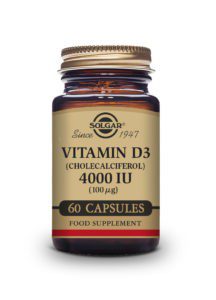





Vitamin D3 4000iu Veg Caps Solgar
£15.59 – £25.56
Vitamin D3 4000iu
A human body produces vitamin D3 4000 as a response to sun exposure. A person can also boost their vitamin D intake through certain foods or supplements.
Vitamin D3 4000 is essential for several reasons, including maintaining healthy bones and teeth. It may also protect against a range of diseases and conditions, such as type 1 diabetes.
Despite its name, vitamin D3 4000 is not a vitamin, but a prohormone, or precursor of a hormone.
Vitamins are nutrients that the body cannot create, and so a person must consume them in the diet. However, the body can produce vitamin D3.
In this article, we look at the benefits of vitamin D, what happens to the body when people do not get enough, and how to boost vitamin D intake.
Benefits of vitamin D3 4000
Vitamin D3 has multiple roles in the body. It assists in:
- promoting healthy bones and teeth
- supporting immune, brain, and nervous system health
- regulating insulin levels and supporting diabetes management
- supporting lung function and cardiovascular health
- influencing the expression of genes involved in cancer development
We include products we think are useful for our readers. If you buy through links on this page, we may earn a small commission. Here’s our process.
A human body produces vitamin D3 4000 as a response to sun exposure. A person can also boost their vitamin D intake through certain foods or supplements.
Vitamin D3 is essential for several reasons, including maintaining healthy bones and teeth. It may also protect against a range of diseases and conditions, such as type 1 diabetes.
Despite its name, vitamin D3 4000iu is not a vitamin, but a prohormone, or precursor of a hormone.
Vitamins are nutrients that the body cannot create, and so a person must consume them in the diet. However, the body can produce vitamin D3.
we look at the benefits of vitamin D, what happens to the body when people do not get enough, and how to boost vitamin D intake.

Vitamin D has multiple roles in the body. It assists in:
Deficiency
Although the body can create vitamin D, a deficiency can occur for many reasons.
Causes
Skin type: Darker skin, for example, and sunscreen, reduce the body’s ability to absorb the ultraviolet radiation B (UVB) rays from the sun. Absorbing sunlight is essential for the skin to produce vitamin D.
Sunscreen: A sunscreen with a sun protection factor (SPF) of 30 can reduce the body’s ability to synthesize the vitamin by 95% or moreTrusted Source. Covering the skin with clothing can inhibit vitamin D production also.
Geographical location: People who live in northern latitudes or areas of high pollution, work night shifts, or are homebound should aim to consume vitamin D from food sources whenever possible.
Breastfeeding: Infants who exclusively breastfeed need a vitamin D supplement, especially if they have dark skin or have minimal sun exposure. The American Academy of Pediatrics recommend that all breastfed infants receive 400 international unitsTrusted Source (IU) per day of oral vitamin D.




















Reviews
There are no reviews yet.